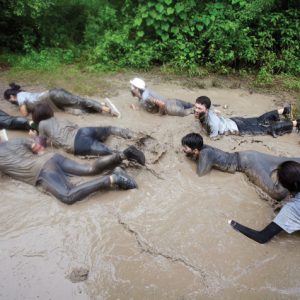College freshman Pokai Saengrojrat went to tranquil Sai Noi beach, 200km south of Bangkok, for a night of revelry with 40 fellow students from Pathum Thani Technical College. It was the evening of August 29, 2014, and the 16-year-old was only just beginning to recover after a leukaemia diagnosis a few years earlier. But ready to enjoy his first year at college, he and his peers were preparing to undergo a series of initiation rituals – known locally as rab nong – that have become ingrained in Thailand’s educational institutions.

The following morning, Saengrojrat’s parents arrived at a nearby hospital to identify their son’s body. A group of students had arrived with his corpse in the early hours, told the doctors he had drowned and then quickly fled. It soon emerged, as reported by the Bangkok Post, that as part of the hazing ceremony Saengrojrat and his first-year peers were made to drink copious amounts of alcohol by senior students, who then pressed his face down in the sand as the tide washed over it.
Initiation ceremonies have been taking place in Thailand’s universities and technical colleges for decades. Organised by more senior students, often with the tacit approval of college authorities, they are intended to integrate first-year pupils and to foster the ethos of what is known as Sotus: Seniority, Order, Tradition, Unity, and Spirit.
The rites differ from college to college, and often see freshmen being made to sing songs, take part in embarrassing dances or conform to peculiar rules, such as only dressing in black or not being able to leave campus without the permission of senior students. It is believed that such initiation rites were adopted after World War Two, when Thai students filtered through US military cadet schools and brought the practice back home. Nowadays, many undergraduates see such ceremonies as harmless fun – endured and then forgotten.
But in recent years, a darker side of the tradition has emerged at some of the country’s higher education institutions that can best be described as hazing – the physical or mental abuse of a newcomer to a group.
In 2012, four senior students from Bangkok’s Thaivichitsilp Art School were convicted over a hazing incident in which three freshmen suffered burns after being made to roll on fire embers. In September, more than 50 students from a Bangkok university were ordered to undergo a three-day military bootcamp as punishment for their involvement in a hazing incident. And then, last month, Thailand’s education ministry launched an investigation into what it called “indecent hazing activities” at the country’s colleges. This came after a one-minute video clip went viral on social media showing first-year students engaged in a ‘mouth-to-mouth’ feeding ceremony. Photos of a student’s buttocks being engulfed in a ball of fire were also circulated online in recent months.
Although most technical colleges and universities have banned hazing, and the country’s education ministry outlawed drinking and smoking at freshmen initiations, the practice remains widespread. Often it takes place off campus, and has become more dangerous, according to members of Anti-Sotus, a group of activists opposed to the hazing culture.
Keerati Panmanee, 25, a graduate of Bangkok’s Kasetsart University, became a member of the student activities board in his first year of study. The committees are often the ones that decide on the initiation rituals.
By his second year at university, Panmanee began to question the purpose of initiating freshmen. He hated seeing senior students shouting at and berating the younger students, both of which are common forms of punishment and humiliation. And there were certain incidents that concerned him, such as when a third-year student took a particular dislike to a female freshman.
She had her hair dyed, and one senior considered her as a whore and gave her a feeling that other people didn’t like her too.
Keerati Panmanee
By his third year, he had left the activities board and joined Anti-Sotus, founded via Facebook in 2010 by a student of Chiang Mai’s Maejo University, which has become notorious for hazing.
Kollawach Doklumjiak, 22, had a harrowing experience at his Bangkok vocational college. Violence is generally worse at vocational colleges than at universities, with Bangkok’s said to be the worst. He describes students being severely beaten, forced to eat lit cigarettes and having firecrackers inserted into their rectums during initiation ceremonies. He says one of his friends even had his penis burnt with a candle and, now, cannot have sex.
“Vocational schools are like gangs,” Doklumjiak says, adding that there is intense rivalry between the different colleges that often descends into all-out turf war on the city’s streets. In 2012, there were 1,222 cases of student violence in Bangkok alone, Manit Wongsomboon, deputy commissioner of the city police, told Al Jazeera. Included in this number were 20 deaths or serious injuries, and the primary offenders were students of vocational colleges.
Doklumjiak speaks candidly about what he saw. Fellow students carried guns, assaulted other students, and he once saw pupils from his college hijack another college’s bus. He admits taking part in the violence, but only in self-defence.
He believes that hazing and initiation rites serve the same purpose, to create ‘in-groups’ and ‘outsiders’; a sense of us versus them.
It’s all about power.
Kollawach Doklumjiak
Anthropologists and psychologists have been fascinated by initiation ceremonies – or rites of passage – for centuries because almost every community around the world engages in them. Young male members of the Chambri tribe, in Papua New Guinea, are initiated through scarification; elders cut their backs, chests and buttocks to form elaborate patterns similar to the scales of crocodiles. On occasion, the practice has proved fatal.

Many initiation rituals, such as pledging oaths of allegiance or the symbolic act of baptism in Christianity, are benign. However, other rites of passage often involve inflicting abuse including physical assault, sleep deprivation and overconsumption of alcohol on the newcomer. In US colleges, hazing has become a national concern, banned in 44 states. Since 1970, there has been at least one hazing-related death per year – 82% caused by alcohol consumption – according to researchers from the University of Maryland.
In a 1959 study, Stanford University psychologist Elliot Aronson posited that hazing causes the victim to suffer cognitive dissonance – the discomfort of holding two contradictory beliefs at one time, allowing them to justify the suffered abuse by increasing their affection for the hazing group. Five decades on, psychologists from Colgate University, also in the US, added that not only does hazing increase affection for ‘in-groups’, it also forges dependence on senior group members.
As Doklumjiak says, hazing and initiation rites are essentially about power. And this is what gravely concerns Anti-Sotus.
Panmanee says that when the ethos of Sotus was first being formed in Thai universities, it was moderate, led by good people and about participating in fun activities. However, it eventually turned sour. “Hazing is all about a culture of authority,” he says. “Some senior students want the respect of junior students, so they force them into a system of control. It is a system of authoritarianism, of obedience.”
Chawis Vorasunt, 23, a bespectacled and softly spoken graduate of Burapha University, in Chonburi, says this power structure can be seen across Thai society. He says that Thais are told at school and university, then in wider society, what to be and how to think. “Hazing makes the individual weaker; you cannot be what you want to be. You have to conform,” he says.
Yukti Mukdawijitra, an assistant professor of sociology and anthropology at Thammasat University in Bangkok, says it makes people reliant on hierarchy and personal networks, which creates patronage systems later in life. Furthermore, Mukdawijitra argues, hazing in colleges is also a political issue.
The hazing system means people cannot speak freely, they have to listen to the seniority. That means the whole Thai society becomes like a hierarchy and like the military system.
Yukti Mukdawijitra
Vorasunt says that if a college student denounces the Sotus ethos or refuses to participate they are seen as “evil”. He likens the fate of those who question authority to “a black sheep in a large pack of wolves”.
Early last year, Lalita Hangwong, a professor at Mahasarakham University, spoke out against hazing activities on Facebook and subsequently received death and rape threats online. According to the Bangkok Post, the university administration was unconcerned. “The university’s acting rector defended the students’ [hazing] and dismissed the issue as a personal one,” the newspaper reported.
Patricio Abinales, a professor at the University of Hawaii and expert on hazing in the Philippines, thinks Thais should take note of what is happening in the Philippines, where 24 students are believed to have been killed during hazing ceremonies since the turn of the century.
“From a social standpoint, it creates the impression that violence is a necessary condition when dealing with one’s rivals or enemies, and it has made it easier for most Filipinos to accept violence as a ‘way of life’,” he warns.
Hazing in Thailand’s colleges ensures that conformity is king and those who rebel against the norm face ostracism or threats of violence. The question of whether this is a result of a wider culture of obedience and hierarchy or if hazing fuels that culture is something of a chicken-and-egg situation.
As for the future of hazing and initiation in Thai colleges, Anti-Sotus wants to create something new: activities that are not compulsory for every student and that allow pupils to form new groups centred around what they want to do. In essence, as Vorasunt puts it: “I want society to respect the privacy and autonomy of the people.”


